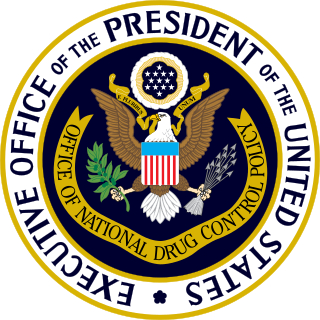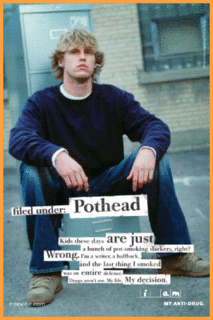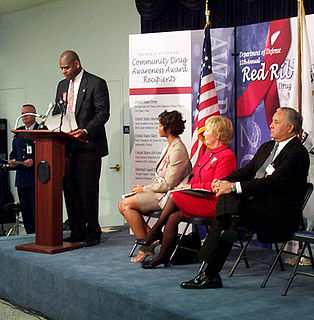
The Office of National Drug Control Policy (ONDCP) is a component of the Executive Office of the President of the United States.

"Just Say No" was an advertising campaign prevalent during the 1980s and early 1990s as a part of the U.S. "War on Drugs", aiming to discourage children from engaging in illegal recreational drug use by offering various ways of saying no. The slogan was created and championed by First Lady Nancy Reagan during her husband's presidency.
This article is intended to give an overview of several arguments for and against drug prohibition.
Alcohol education is the practice of disseminating information about the effects of alcohol on health, as well as society and the family unit. It was introduced into the public schools by temperance organizations such as the Woman's Christian Temperance Union in the late 19th century. Initially, alcohol education focused on how the consumption of alcoholic beverages affected society, as well as the family unit. In the 1930s, this came to also incorporate education pertaining to alcohol's effects on health. For example, even light and moderate alcohol consumption increases cancer risk in individuals. Organizations such as the National Institute on Alcohol Abuse and Alcoholism in the United States were founded to promulgate alcohol education alongside those of the temperance movement, such as the American Council on Alcohol Problems.
Red Ribbon Week is an alcohol, tobacco, and other drug and violence prevention awareness campaign observed annually in October in the United States. It began as a tribute to fallen DEA special agent Enrique Camerena in 1985. According to the United States DEA, Red Ribbon Week is the nation's largest and longest-running drug awareness and prevention program.
Above the Influence originated as a government-based campaign of the National Youth Anti-Drug Media Campaign conducted by the Office of National Drug Control Policy in the United States that included broad messaging to focus on substances most abused by teens, intended to deliver both broad prevention messaging at the national level and more targeted efforts at the local community level.

In the United States, the non-medical use of cannabis is legalized in 17 states and decriminalized in 13 states as of April 2021. Decriminalization refers to a policy of reduced penalties for cannabis offenses, typically involving a civil penalty for possessing small amounts, instead of criminal prosecution or the threat of arrest. In jurisdictions without penalty the policy is referred to as legalization, although the term decriminalization is sometimes used for this purpose as well.
The American Childhood Cancer Organization (ACCO), previously named Candlelighters Childhood Cancer Foundation, is a 501(c)(3) non-profit charitable organization dedicated to childhood cancer.
URGE is a reproductive rights and justice non-profit organization in the United States based in Washington, D.C. Although it is based in Washington, D.C., URGE has programs planted throughout multiple states of the country. These states include Alabama, California, Georgia, Kansas, Ohio, and Texas. URGE is youth-led, with a focus on pro-choice movements. URGE changed its name in July 2014 and was formerly called Choice USA. They are led by young leaders throughout America. URGE creates resources through campus chapters and community activist networks, inviting people to explore and act on their own strength. In cooperation with other justice-oriented organizations, URGE members train their communities and promote local, state and national policies. Today, young people are often portrayed as disengaged and reckless. We're anything but, really. We are more modern, educated and far more connected than our ancestors. We are strong, committed and willing to lead.

Substance abuse prevention, also known as drug abuse prevention, is a process that attempts to prevent the onset of substance use or limit the development of problems associated with using psychoactive's substances. Prevention efforts may focus on the individual or their surroundings. A concept known as "environmental prevention" focuses on changing community conditions or policies so that the availability of substances is reduced as well as the demand. Individual Substance Abuse Prevention, also known as drug abuse prevention involves a numerous amounts of differently sessions depending on the individual to help cease or reduce the use of substances. The times period to helping a specific individual can vary based upon many aspects of and individual.The type of Prevention efforts should be based upon the individuals necessities which can also vary.

Smokingamong youth and adolescents is an issue that affects countries worldwide. While the extent to which smoking is viewed as a negative health behavior may vary across different nations, it remains an issue regardless of how it is perceived by different societies. The United States has taken numerous measures, ranging from changes in national policy surrounding youth cigarette access to changes in media campaigns, in attempts to eliminate the use of tobacco products among teenagers. Approximately 90% of smokers begin smoking prior to the age of 18. In efforts to reduce the total number of smokers and negative effects smoking has on society, it is necessary to reduce the number of youth and adolescents who begin smoking.
National Families in Action is a 501 (c) (3) non-profit organization that was founded in Atlanta, Georgia in 1977. Its mission is to help children succeed by empowering parents to create an academic and social environment where children thrive and are protected from substance abuse and other high-risk behaviors. The organization obtained the nation's first state laws banning the sale of drug paraphernalia. It helped lead a national effort to help parents replicate Georgia's laws in other states to prevent the marketing of drugs and drug use to children. Along with the Parents Resource Institute for Drug Education (PRIDE) and the National Federation of Parents for Drug-Free Youth, it helped parents form parent drug prevention groups to protect children's health. Federal officials credit the parent movement with the two-thirds reduction in past-month drug use among adolescents and young adults that occurred between 1979, when drug use among these age groups peaked, and 1992, when their drug use fell to the lowest levels since national surveys began.

The National Youth Anti-Drug Media Campaign is a current domestic government propaganda campaign in the United States conducted by the Office of National Drug Control Policy (ONDCP) within the Executive Office of the President of the United States with the goal to "influence the attitudes of the public and the news media with respect to drug abuse" and of "reducing and preventing drug abuse among young people in the United States".

Partnership to End Addiction, first known as the Partnership for a Drug-Free America (PDFA) then later as the Partnership at DrugFree.org, and The Partnership for Drug-Free Kids is a New York City-based non-profit organization which runs campaigns to prevent teenage drug and alcohol abuse in the United States. It is notable for mobilizing volunteer talent "against a single social problem" to help young people "live their lives free of drug and alcohol abuse," and to assist parents in prevention efforts. The organization gets input from scientists, specialists in communication, researchers and others, and offers resources for parents and teenagers on its website. It focused efforts to "unsell" illegal drugs such as cocaine, heroin, prescription drugs, marijuana, MDMA, and others, as well as discouraging abuse of alcohol and nitrous oxide, by breaking away from a standard public service approach and doing a coordinated media campaign. While the organization has focused drug prevention advertising on broadcast media such as television, there are signs in recent years that it is shifting media support to emerging channels such as video-on-demand, digital technology and particularly the Internet. The organization's marketing experience was written up as a 58-page marketing "case study" for study by students at the Harvard Business School. The organization is perhaps best known for its iconic TV ad This Is Your Brain on Drugs, but it had made over 3,000 ads by 2011 while pursuing a flexible strategy.

Nurse-Family Partnership (NFP) is a non-profit organization operating in the United States. NFP is an evidence-based, community health program that helps transform the lives of vulnerable mothers pregnant with their first child. Each mother served is partnered with a registered nurse early in her pregnancy and receives ongoing nurse home visits that continue through her child's second birthday. NFP intervention has been associated with improvements in maternal health, child health, and economic security.
Smart Approaches to Marijuana is a political organization opposed to marijuana legalization and commercialization. SAM describes itself as a bi-partisan partnership that works with local, state, and federal legislators to create policies that decrease marijuana use. SAM advocates for civil penalties for marijuana use, along with mandated treatment, prevention, education, and awareness. The media has called SAM the "well-organized opposition" to marijuana legalization.
During the administration of American President Jimmy Carter (1977–1981), the United States gave further consideration to the decriminalization of cannabis (marijuana), with the support of the president. However, law enforcement, conservative politicians, and grassroots parents' groups opposed this measure. The net result of the Carter administration was the continuation of the War on Drugs and restrictions on cannabis, while at the same time cannabis consumption in the United States reached historically high levels.
"Nothing Happens", also called "Nothing can happen to you, too", or "Marijuana can make nothing happen to you, too", was an anti-cannabis public service announcement created by the United States Office of National Drug Control Policy (ONDCP).







